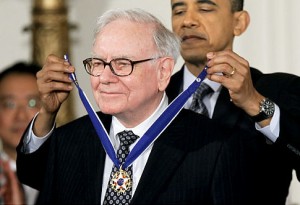(ThyBlackMan.com) In a climate of economic uncertainty defined by widespread joblessness and declining net worth among median income households, it’s not difficult to understand why average Americans would want to wage what Republicans termed “class warfare” in order to secure a fair tax rate. If I still worked as a New York City public schoolteacher for $50K per year, for example, I would have been one of thousands of struggling middle-class wage earners saddled with 67% of the total national tax burden in 2007, according to a controversial Congressional Budget Office study released last year, and I might still be at risk of losing my job this year due to public sector  layoffs and other so-called “austerity measures” imposed in New York and across the country after the Great Recession began. So the recent news that President Obama’s economic team would propose a “Buffet Rule” minimum tax on taxpayers earning over $1 million dollars per year, as well as a long-overdue repeal of the Bush-era tax cuts for households earning more than $250,000 per year, seemed like a step in the right direction, and came as a relief to working folks everywhere, including me.
layoffs and other so-called “austerity measures” imposed in New York and across the country after the Great Recession began. So the recent news that President Obama’s economic team would propose a “Buffet Rule” minimum tax on taxpayers earning over $1 million dollars per year, as well as a long-overdue repeal of the Bush-era tax cuts for households earning more than $250,000 per year, seemed like a step in the right direction, and came as a relief to working folks everywhere, including me.
Finally, it seemed, a more equitable tax code would level the playing field for millions of debt-laden, middle-class workers and students and rechristen the American Dream for average families struggling to keep their homes out of foreclosure and to make ends meet. The “Buffet Rule”, named for billionaire investor Warren Buffet, combined with the Obama administration’s unique brand of deficit-reduction measures, would scuttle the tax advantages enjoyed by the nation’s financial elite for decades by eliminating obscenely low tax rates on capital gains and investment earnings. Top-tier income households would instead pay a proportion of tax on their varied income comparable to the share paid on ordinary wages by middle-class households.
Sadly, the implications of Mr. Obama’s tax proposal for middle to low income households suggest a mere symbolic and moral victory, rather than a political one. The “Buffet Rule” is legislation that is offered in the spirit of equality, but will not substantively impact the dire economic reality faced by blue-collar workers and urban communities of color across the country. The “Buffet Rule” does nothing to correct the disproportionately disastrous impact of the 2008 housing market crisis on Blacks and Hispanics, for example; a Pew Research Center study released in July revealed the widest “wealth gap” between White and minority American households in 25 years due in large part to a more dramatic decline in home ownership and the value of home equity among Blacks and Hispanics after the Great Recession. Nor can the “Buffet Rule” correct the broader historical legacy of American slavery and discrimination as reflected in a relative paucity of financial assets held by Black households over the course of several generations (i.e. stocks, bonds, mutual funds, thrift accounts, retirement accounts) when compared to White households. In short, the “Buffet Rule”, and President Obama’s economic recovery plans in general, fall far short of the sort of measures required to give a meaningful boost to African-American financial health.
Only a government-sponsored effort on the scale of FDR’s “New Deal” of the 1930s could lift African-Americans out of their current economic plight and set them on the road to permanent recovery, as well as restore equity to the national financial system. Roosevelt’s Civilian Conservation Corps (CCC), a government agency created under the auspices of the New Deal legislation, was one of a slew of programs that created jobs and hard won financial independence for thousands of unemployed Americans during the Great Depression. President Obama’s comparatively less bold “American Jobs Act” offers small tax credits to veterans, modest payroll tax cuts to some small-business owners, and invests $35 billion into the public sector to stem teacher, police, and firefighter layoffs and another $50 billion into infrastructure spending, which creates temporary construction jobs. While ostensibly staving off an even worse downturn in the American economy, these half-measures proposed by the Obama administration, in conjunction with the “Buffet Rule” tax reform, do relatively little to provide long-term relief to the public or offer significant aid to Blacks and Hispanics, who felt the worst of the financial meltdown in 2008 and who continue to suffer the most from its effects.
Some critics of Obama suggest he faces a tough reelection bid among African-American voters in 2012 because of a perceived neglect of the persistently higher jobless and poverty rates in African-American communities. Some say the promise of economic equality for minorities implicit in the election of the first Black president of the United State has gone unfulfilled. It is certainly true to say that the “Buffet Rule” and similar legislation, while well-intentioned, does not go far enough to address the deep systemic inequalities that have produced the most unequal distribution of wealth in American society since the Gilded Age of the 1920s. If Mr. Obama does not pursue economic reform on behalf of vulnerable Black communities with the urgency the task demands, Black voters may feel no sense of urgency to return him to the White House next year.
Staff Writer; David Christopher Steele, M.A.
Official website; http://www.facebook.com/steele.dave88




















Warrent Buffett doesn’t even support Obama’s “Buffett Rule”! Buffett is only open to a tax increase on the ultra-wealthy “multi-billionaires”. Buffett should start by paying the billion dollars in back taxes he owes IRS……..Berkshire Hathaway’s balance sheet has over 47 billion in cash.
Anyone working hard for their money and forgoing the lifestyles of the Joneses and finds themselves at millioniare status is not willing to fork over their sweat equity to give to Obama to pass along to his cronies ie. Wall Street, Solyndra, General Electric, etc!
Make no mistake, Obama is playing CLASS WARFARE!
I find this article to be well research, thought out and the conclusions were well drawn. I just wish a man with the author’s knowledge and education would have gone further and shared with us readers what workable course we should take that would help us though this very stressful time.